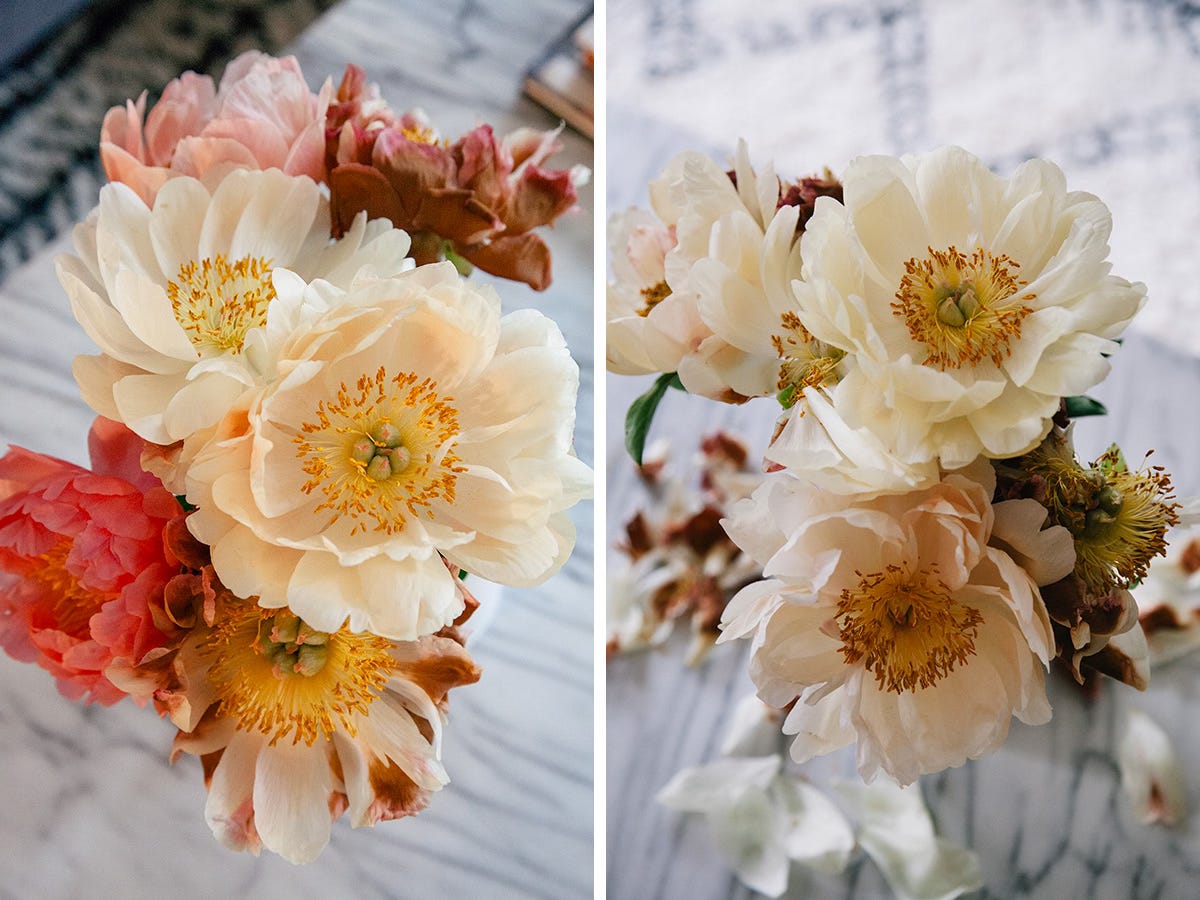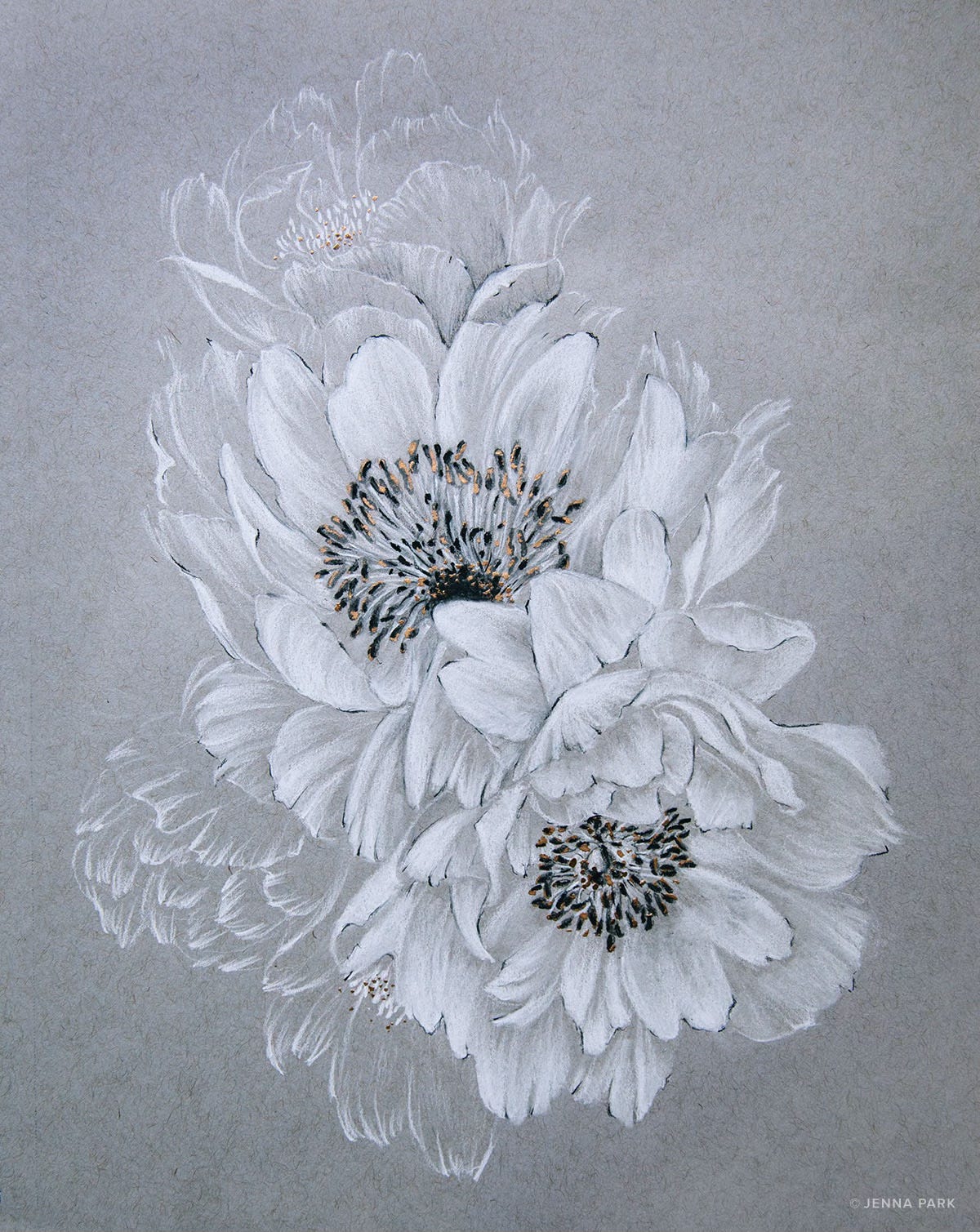The complexities of grief
Dispatches from the art studio (aka my couch), the symbolism of peonies, and examining the complexities of my grief for my father.
All this week, I watched this beautiful bouquet of peonies on the coffee table undergo a stunning color transformation, changing from a half dozen vibrant pink buds into large, cup-shaped white blooms. I thought they were losing color. The florists subreddit tells me that they are a variety called Coral Charms and that’s what they do when they open and flower. I had no idea.
I took a photo daily to document the change. Half the blooms gently faded to a pale cream blush. Others in the bouquet lost their color more dramatically, their petals deepening to a dark red, like old blood stains, while the edges began to curl and turn white. The two colors clashed as if in battle. This particular shade of pink on these Coral Charms is the exact persimonny pink of my once favorite vintage cardigan—it is my happy color. The white ones felt a touch morose, like a ghostly apparition. I couldn’t decide which color I enjoyed more.
Once fully bloomed, the petals started dropping, sending little yellow plumes of pollen from their stamens into the air. This could have been the source of our sneezing and itchy eyes. Late at night when the apartment was quiet, I could hear an audible thud as they hit the table one by one. How can something that weighs literally nothing make a sound as it lands?
I am not one of those people who regularly stops by a deli to pick up a bouquet of flowers on my way home. It’s stupid I know, but I rarely want to spend money on something that will die in a week or less—not even something that brings me so much joy. I’ll admit this here even at the risk of sounding ridiculously cheap. I still get joy out of visiting all the flowers at bodegas and markets on my walks, and the kids know that the only thing I want for Mother’s Day is peonies. At least once a year I get to enjoy them at home. I just didn’t know that I would be getting a dramatic show this year. I felt like I was witnessing the arc of life and death.
This week’s drawing—I’m in a peony phase
I have entered a floral phase in my drawings. It’s not surprising since there are flowers everywhere right now. I grab a long-neglected tonal grey sketchbook from the shelf and a single white charcoal pencil. I get to work. I usually draw late at night, past 11pm. It’s a ridiculous hour of darkness that already puts a strain on my aging eyes. I clip a tiny LED light onto my sketchbook.
This is how I’ve made my drawings over the past six months, on the couch with this tiny light. I am still avoiding color—or I should say, I’m not very motivated to break into color just yet (also, I’m lazy), but this white on tone drawing shakes things up just enough that it’s a diversion from the rut of charcoal drawings that I’ve been exclusively making.
The next morning, I rummage around for a small rectangular pan of gold watercolor paint in my desk drawers that I remember seeing. I bought it nearly ten years ago, but it’s never been opened. I dip the smallest paintbrush that I can find into a glass of drinking water that is already on my desk and test the viability of the paint. I’m pleased when I see that the water activates the pigment. I dot the stamens with flecks of gold. I have always loved a bit of sparkle.
May has come to represent the fragility of life
Somehow, May has rolled around again. It always does. Out of all the months of the year, May has come to embody a dizzying dread of the most fragile memories that I’m still trying to sort through for the past ten years. I’m still collecting my thoughts on what the significance of a ten-year anniversary of losing someone means. That’s for next week, but today I’m thinking about someone else: my dad would have been 80 today.








